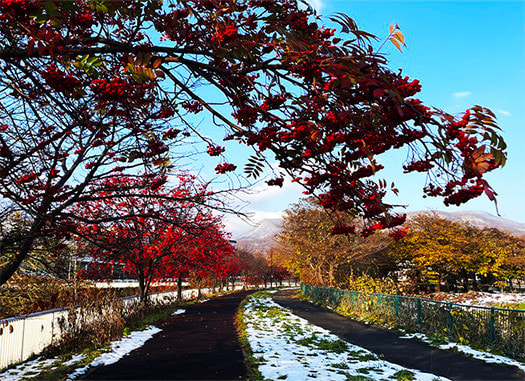
写真は先週日曜日の早朝にカミさんと歩いていた散歩道の様子。わが家は札幌市西区を流れている発寒川流路周辺ですので、その流路に沿って造作されている河畔公園は好きな散策路になっている。最近、カミさんもダイエット作戦が昂じてきて、カーブスなどの有料サービス主体だったものが、すこしづつわたしの早朝散歩に随伴してくれるようになってきた。
まぁ散歩はもう数十年継続してきているので、それが自分自身の健康面でどのように効果があるのか、あんまり気付かない。いくつかの病はかかっているし薬はずっと飲み続けている。ときどき病院に入院というようにお世話になってもいるけれど、日常生活では行動制限されるようなことはない。散歩はなにより「お金が掛からない」(笑)。体に良い、というような情報に踊らされるような行為ではない。
で、カミさんといっしょに歩くようになると彼女のためにも、散歩コース選択というのはより意図的になってくるものですね。こちらの散策路中には「西野緑道」という植樹など多様に工夫された緑地などもあって、眼にも楽しい風景が展開してくれる。本来は自然そのままが良いのでしょうが、札幌のような市街地では必然的に、こういった意図的な「環境整備」が求められるのでしょう。
写真をご覧になっておわかりのように先週降った雪が土の路面には残っていて、また遠い山並みには樹間に軽い積雪が遠望される。木々は紅葉のうつろいを見せてくれていて、いまどきはナナカマドが実も葉も真っ赤に染まっている。これから葉が落ちていって実だけが赤く残っていく。そういう季節感情報が歩いていく環境から、人間にさまざまに伝わってくる。
まぁいろいろなこうした背景環境をその日の気分で数コース、自分の「お気に入り」として登録(笑)しているのですね。それがカミさんといっしょというファクターが加わってくると、「きょうはこっちに連れて行ってあげようかな」などと考えている。おおむねの「歩数」計算と同時に、ビジュアル要素がより強化されて選択しているように思う。「あんな景色を見せられたら良いな」みたいな。そしてそのような視界が広がってくる瞬間に共感が持てたら、ある種の「シアワセ」感がある。
「住む」という愛着要素のなかには、こういう日常的なバックグラウンド環境というものが非常に大きいように思われてくる。住宅本体への嗜好性選択というものがもちろん第1義的ではあるけれど、その先にはこのような「周辺環境」性というものが大きくなっていくのでしょうね。
English version⬇
A search for an environment that makes you want to go for a walk to improve your health.
The basic principle of residential construction is to create a good environment, but when you think about the “way of living” beyond that, you realize that the attachment factor as a zone is a major factor. The “zone” is a place where people feel attached to.
The photo shows the walking path that I was taking with my wife early last Sunday morning. Our house is located near the Hassamu River, which flows through Nishi Ward, Sapporo City, so the riverside park along the river is one of our favorite places to walk. Recently, my wife has been on a diet, and she has started to accompany me on my early morning walks, although she used to mainly go to Curves and other fee-based services.
Well, I have been taking walks for several decades now, so I don't really notice the effect it has on my own health. I have had several illnesses and have been taking medication for a long time. I have been hospitalized from time to time, but I am not restricted in any way in my daily life. Walking is the most “cost-effective” thing I can do (laughs). It is not an activity that is driven by information that says it is good for the body.
When I started walking with my wife, I became more intentional in choosing a walking course for her. The walking paths here include “Nishino Ryokudo” (Nishino Greenway), which is a green space with a variety of planting and other creative features, and offers a pleasing sight to the eye. Although it would be better to leave nature as it is, in an urban area such as Sapporo, this kind of intentional “environmental improvement” is inevitably required.
As you can see in the photo, snow that fell last week is still on the dirt road surface, and in the distant mountains, you can see a light accumulation of snow between trees in the distance. The trees are showing us the changing colors of autumn. The leaves will fall and only the fruits will remain in red. This kind of seasonal information is conveyed to us by the environment in which we walk.
Well, depending on my mood on any given day, I have registered several courses in these background environments as my “favorites” (laughs). When I add the factor of walking with my wife, I think to myself, “I should take her this way today. I think that the visual element has been strengthened and the choice has been made at the same time as the general “number of steps” is calculated. Like, “I wish I could show him a view like that.” And if we can empathize with the moment when such a view expands, there is a certain sense of “sheer happiness”.
This kind of daily background environment seems to be a very important factor in the attachment to “living” in a house. Of course, preference for the house itself is the primary factor, but beyond that, this kind of “surrounding environment” is likely to play an important role.




























※コメント投稿者のブログIDはブログ作成者のみに通知されます